Bennett Kaplan is tall, straight talking, and charismatic, with a quick sense of humor. He is well rehearsed and charming, but knows his stuff and is interesting to talk to. He is an idealist, a deep thinker, and has a fascination with how things work. He is also a big shot businessman, of the type you normally hear about but do not see that often.
He made aliyah in 1991 from Queens, New York, and has always been a drinker; but unlike most imbibers, he is incurably curious and has to know the A to Z of everything he touches. He therefore enjoyed drinking spirits, usually vodka, but just had to make himself aware of the history and the technology of production. This caused an itch he felt compelled to scratch, and he knew he wanted to take his knowledge and passion further. He fulfilled his vision by founding the Thinkers Distillery in 2018.
The history of the Jews in Eastern Europe, in particular Poland and Russia, was very much associated with distillation, and their poison of choice was vodka. Furthermore, in America, the rebirth of a spirits industry after the dry years of Prohibition was led by Jewish bootleggers who became distillers. Who has not heard of the Bronfman family and Seagram?
In Israel, spirits production was always a local, rather amateurish affair. Even when I came to Israel, two years before Kaplan, there were 12 wineries, and all but one (the Golan Heights Winery) also distilled spirits.
This was nothing new. The Zion Winery, founded by the Shor family in 1848, produced spirits. The Shimshon Winery, founded in 1955 by a later generation of the same family in Jerusalem, originally produced only spirits.
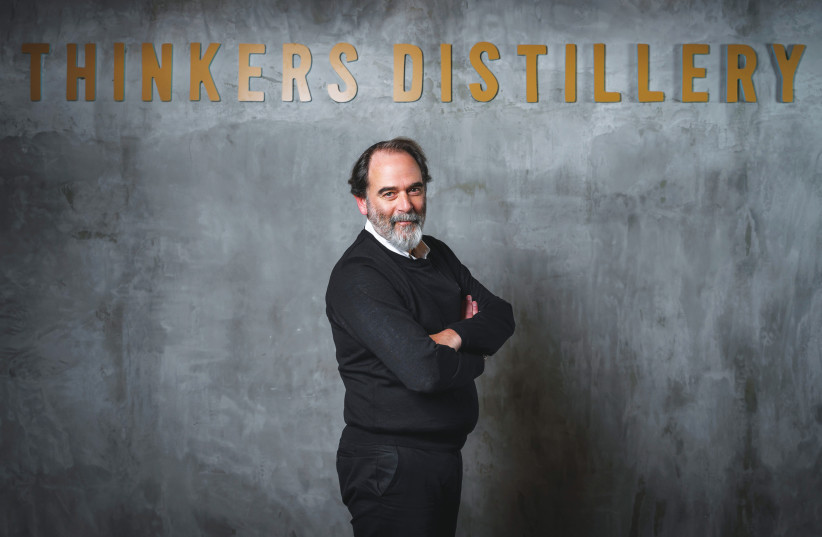
Carmel Winery started distilling in 1898 to use up excess grapes. Its beautiful copper stills and the tall column still (the reason for one of the towers at Rishon Le Zion Cellars) were sadly discarded and trashed when the winery left Rishon in 2016. I remember when, in the 1990s, for a golden period, the Carmel bottling plant worked 24/6 to supply Vodka Stopka to Russia. Rather like selling ice to the Eskimos.
However, in truth, Israeli spirits were not great. As soon as the gates of imports opened, the global brands arrived, and the Israel-produced spirits industry withered on the vine. They left behind the memory of some very good brandies, produced by Carmel and Tishbi, and the well-known Sabra, an original chocolate orange liqueur, but not much else. The big sellers were then Elite Arak (still distributed everywhere and a big brand today) and Stock 84 Brandy. However, most of the white or clear spirits were produced from cheap imported alcohol made from molasses.
Kaplan explained to me how, globally, the spirits industry reinvented itself in the early 2000s. Distilleries added science and technology to the local, farming traditions that were passed down within founding families. Barmen and mixologists became knowledgeable and creative like chefs, making spontaneous cocktails based on customer preferences and the fresh ingredients available. The search for quality by the consumer encouraged the birth of a deluxe sector, and the move to “premiumization” followed and has continued until today.
I suppose aged blended whiskies like Chivas Regal and Johnnie Walker Black label were early manifestations of this, being in their time a step upward. The Bronfman and Walker families were ahead of the game. Then came the rebirth in interest of malt whiskies.
With regard to white spirits, Kaplan explained that Grey Goose Vodka and Hendricks Gin were the particular spirits that broke the mold and gave him a signpost to the future. The renaissance of gin, which Kaplan called the “Ginaissance,” for him encapsulated the new fast-changing spirits industry. This was a subject that fascinated him, enticed him, and drew him in. He read, drank, and visited all over in order to broaden his knowledge. Far from assuaging his hunger, it only fueled his passion.
In the last 15 years in Israel, there has been a sprouting of new artisan distilleries, making products using Israeli ingredients where possible. Julius Distillery in the Western Upper Galilee was the pioneer, followed swiftly by Golani; Milk and Honey (M&H); Pelter; Hollander; and Yerushalmi. They produced highly individual expressions with the personal imprint of the distiller. M&H has earned a worldwide reputation for its whiskies, and the others are very well known and respected here by the local bar intelligentsia.
Kaplan particularly admires the passion and pioneering of David Zibell of the Golani Distillery in Katzrin. He recognized here a kindred spirit.
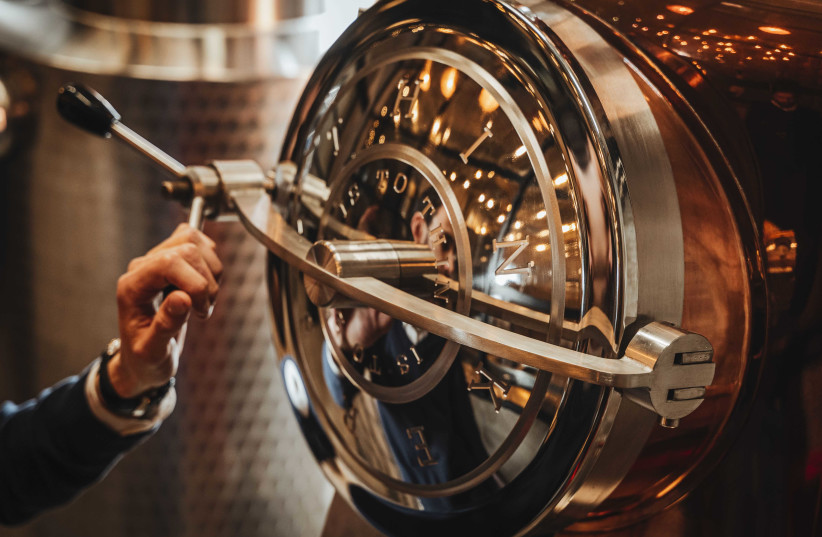
The vision behind Thinkers Distillery
Kaplan’s vision was a long time cooking. He is a man of passions and absolute immersion in the subjects that interest him. These range from cars to Kabbalah. His explanations are peppered with references to Elon Musk and Steve Jobs. He is not flying low. In 2018, he founded the Thinkers Furthered Distillery.
The deep-thinking intellectual distiller-to-be chose names that for him summarize the Start-Up Nation. Words like “thinkers” and “furthered” did it for him. The fact that in all his interviews he has to explain the reasoning behind these names does not lessen his own view that they perfectly represent what he is trying to convey. This and the metallic-looking neck label on his bottles, which quotes from Pirkei Avot “Who is wise? One who learns from every person” is for him what the start-up revolution, or rather evolution, is for him, in a nutshell.
Why evolution? Because he sees the start-up successes as building on something existing, and not necessarily creating something totally new.
He chose Jerusalem as his playground. Out of the new distilleries, his is the first to be based there.
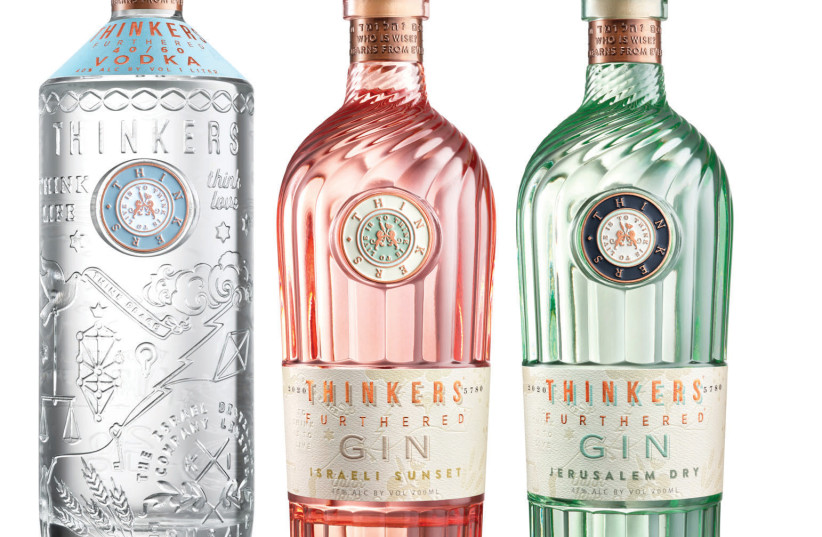
WALKING ALONG Agrippas Street in downtown Jerusalem, super premium spirits do not come to mind. However just like in [C. S. Lewis’s fantasy children’s novel] The Lion, The Witch and the Wardrobe, you come to a pretty undistinguished, unimpressive entrance. On opening the doors, you are welcomed into a whole new world.
The decor and lighting are instantly inviting. Your attention is immediately drawn to spotless, shiny stills, which look so clean as though they have never been used; striking rows of bottles on display; and a bar and tables for individuals or groups to come, taste, and buy.
It is a honey pot for connoisseurs, spirits lovers, or those who want to sample and learn. The bar staff are trained to explain at the level your knowledge requires. It is a great place to visit on the way to or from the Mahaneh Yehuda market, the beating heart of modern Jerusalem. My first visit was by coincidence doing just that.
As of now, Thinkers Distillery produces five core products, each packaged in an outstandingly individual way.
The two vodkas come in a bottle that is a work of art. It is simply covered with sayings, quotes, and words with lifestyle messages. It was designed by someone with a lot to say, and they decided they were going to put it all on a 700-ml. bottle, no matter what. No holding back, no “less is more” here! Some will cringe and think kitsch; I suspect most will think this is a bottle that needs to be turned around in your hands, read, absorbed, and kept for water when the precious vodka is finished. Whatever your view, the bottle is totally unique, highly individual, and absolutely original.
Then there are two gin products, with charming names in the most beautifully designed, feline-like, elegant bottles. One is Jerusalem Dry Gin, and the other is Israel Sunset Gin. If I had a bar, these are the bottles I would have on display.
The newest product is a bourbon, Dew of B’Dolah, distilled in America, aged on the long boat trip over the Atlantic and through the Mediterranean, and then here in Israel.
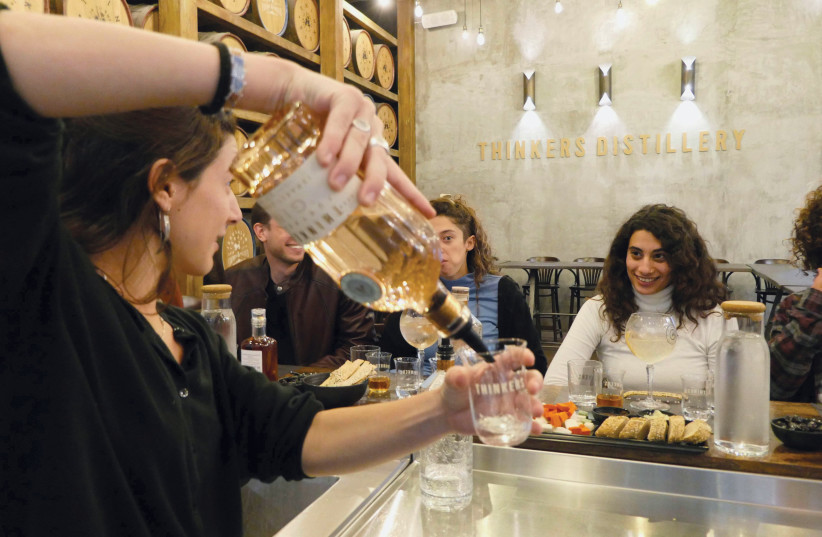
Launching just before COVID was not part of the perfect marketing plan, but nonetheless the distillery has progressed very well. Look carefully and you will see its products on the back shelves of many local restaurants and bars.
Thinkers Distillery is distributed in Israel by Hacarem, one of our leading wine and spirits distributors. It is a marriage that is complementary to both of them. Hacarem is a family company dating from 1921, now managed by the fourth generation of the founding family. Royal Wine and Kedem Europe represent Thinkers in the US and the UK, respectively, but Thinkers has already gained a foothold in quite a few other countries, too.
The Thinkers Vodka at 40% alcohol is the distillery’s best product in my opinion. Most will drink it frozen as a shot, or with a mixer. Very smooth, it is perfect for a vodka martini. At last, we have a national vodka. The base alcohol comes from the best wheat in the Champagne region of France. In producing the highest-quality product he can, Kaplan is not afraid to import and source the very best basic ingredients from abroad.
The water comes from the holy air of Jerusalem. Using the innovative Watergen technology, the distillery is able to convert Jerusalem humidity into water, used for cutting the spirit to commercial levels. The deluxe vodka at 52% alcohol has a good mouth feel, and the distillery recommends it be enjoyed neat, with or without ice.
The Jerusalem Dry Gin, made in the “London Dry Gin” style, has the classic aromas of juniper with lifted citrus notes. The Israeli Sunset Gin comes in an attractive pink bottle. Amid all the botanicals, it also is distilled with rose petals and strawberries, and this gives a subtle floral aroma.
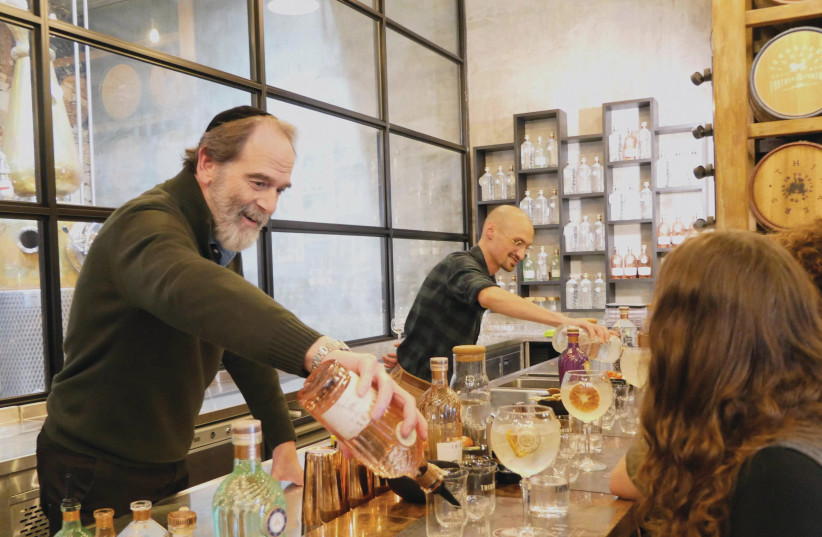
The Thinkers Dew of B’Dolah is a handcrafted, unfiltered, small batch product. It is an authentic bourbon in every way, but with an Israeli twist.
It was made from Kansas corn, distilled in Ohio, and it was then put in charred new American oak barrels. After maturation in cask during the long sea journey, the barrels were then left outside, open to the elements, for a further three and a half years in Haifa.
The name comes from Kabbalah, describing balance and harmony. I am a scotch man myself, but this is a blessing for bourbon drinkers.
The visitors’ center is pristine, glossy, rather like stepping into an advertising postcard. You don’t get the blood, sweat, and tears or smells of a distillery, or the bustle and dirt of production, but you can have a really enjoyable tasting experience coupled with a great atmosphere in the place you would least expect it. Most important, the products are good.
We have experienced the boutique winery revolution in the 1990s, the emergence of craft brewers in the early 2000s, and now artisan distillers since 2010. The drinks industry in Israel is blooming. It has never been so varied with so much quality, variety, and individuality. Thinkers Distillery is an important addition to our drinks scene with products that can stand proud and represent Israel in bars around the world.
Our family motto is “Think and Thank” from Sir Moses Montefiore onward. Tongue in cheek, I have a WhatsApp group, with my two children who are in the wine trade, that we call “Think & Drink.” Thinking and drinking with a Thinkers spirit in hand therefore seems to me most appropriate.
It puts me in the mood for a Thinkers vodka martini, shaken and not stirred, served dirty, with an olive. James Bond would approve!
The writer is a winery insider turned wine writer, who has advanced Israeli wine for 35 years. He is referred to as ‘the English voice of Israeli wine.’ www.adammontefiore.com
